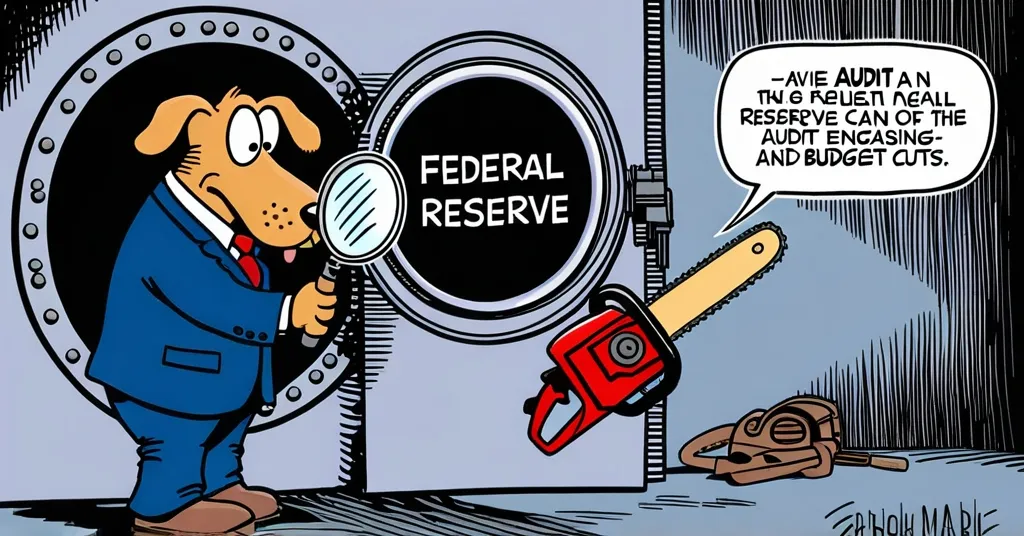Elon Musk Proposes Dogecoin Audit of Federal Reserve at CPAC

Elon Musk Proposes Dogecoin Audit of Federal Reserve at CPAC: A Bold Move for Transparency
At CPAC, Elon Musk shocked attendees by proposing a Dogecoin audit of the Federal Reserve, igniting a firestorm of debate on government transparency. Joined by President Javier Milei of Argentina, Musk’s vision for using DOGE in government oversight has sparked both intrigue and skepticism.
- Elon Musk suggests using DOGE for Federal Reserve and Fort Knox audits
- Appears at CPAC with President Javier Milei
- DOGE claims $55 billion in savings from efficiency measures
- Faces criticism over privacy law violations and budget cuts
During his appearance at the Conservative Political Action Conference (CPAC), a major annual political event in the United States, Elon Musk didn’t just talk about transparency; he embodied it. With a flair for the dramatic, he was presented with a chainsaw by President Milei, symbolizing cuts to excessive government spending. Musk, never one to shy away from controversy, stated,
“All aspects of the government must be fully transparent and accountable to the people. No exceptions, including, if not especially, the Federal Reserve.”
This bold declaration aligns with his previous calls for more scrutiny of the central bank, which already makes its annual financial audits publicly available. Yet, Musk’s proposal to use Dogecoin, a cryptocurrency often associated with humor and community, for such a critical task raises questions about its feasibility and legitimacy.
Musk’s vision doesn’t stop at audits. He and former President Donald Trump are eyeing a redistribution of savings purportedly achieved through DOGE’s efficiency measures. According to DOGE, they’ve managed to save a staggering $55 billion, though only a fraction of this is currently reflected on their website. Musk described this as,
“The money taken away from ‘destructive’ things in the country and organizations that resent the people would be given back, calling it ‘the spoils of battle.'”
However, the term “destructive things” remains vague, leaving room for interpretation. DOGE implemented streamlined processes that reduced operational costs, but the exact nature of these measures and the accuracy of the savings figure are under scrutiny due to discrepancies in reported contract values. The savings claims are further examined in reports on DOGE’s efficiency savings.
Not all is smooth sailing in the land of DOGE. Musk and Trump are facing significant criticism, not just for the feasibility of their plans but for alleged privacy law violations and attempts to slash congressionally approved budgets. The proposed audit of Fort Knox, whose gold reserves are already audited annually and accounted for, according to Treasury Secretary Scott Bessent, adds another layer of complexity to Musk’s ambitious plan. Criticism of Elon Musk and Trump’s DOGE plans has been vocal and widespread.
The intersection of cryptocurrency and political discourse is becoming increasingly blurred, with figures like Musk and Milei pushing the boundaries of what’s possible. While DOGE’s role in government efficiency is noteworthy, the use of a meme cryptocurrency for such critical audits raises eyebrows and questions about its practicality. Experts in the cryptocurrency space have expressed skepticism about using Dogecoin for government audits, citing its volatility and lack of widespread acceptance as a serious financial tool. However, some see it as a provocative move to challenge traditional financial systems. Discussions on platforms like Reddit highlight the varied reactions to Musk’s Dogecoin proposal.
As we navigate this brave new world of financial revolution, it’s crucial to maintain a balanced perspective. Bitcoin and blockchain technology hold immense potential to disrupt the status quo and champion decentralization, privacy, and freedom. Yet, we must also acknowledge the risks and challenges, especially when it comes to integrating these technologies into established systems like the Federal Reserve. Musk’s proposal contrasts with Bitcoin’s role in financial systems, which many view as a more stable and serious contender for financial reform. Questions about the transparency and efficiency of such initiatives are discussed on Quora.
Elon Musk’s proposal at CPAC is a testament to the evolving role of cryptocurrency in our political and economic landscape. It’s a call to action for greater transparency and accountability, but also a reminder that the path forward is fraught with hurdles and skepticism. As we continue to explore the possibilities of bitcoin, DOGE, and other cryptocurrencies, let’s keep our eyes open to both the opportunities and the pitfalls that lie ahead. For more information on the background of these proposals, you can visit the Department of Government Efficiency wiki.
Key Takeaways and Questions
- What did Elon Musk propose at CPAC?
Musk proposed using Dogecoin to audit the Federal Reserve and Fort Knox for greater transparency.
- Who joined Elon Musk on stage at CPAC?
President Javier Milei of Argentina joined him, symbolizing austerity measures with a chainsaw.
- What is the claimed amount of savings by DOGE?
DOGE claims to have saved $55 billion through efficiency measures.
- What criticisms are Musk and Trump facing?
They face criticism for privacy law violations and budget cuts.
- What are the plans for the savings from DOGE’s cost-cutting measures?
Plans include distributing savings to Americans and clearing national debt.
- How often are Fort Knox’s gold reserves audited?
Fort Knox’s gold reserves are audited annually, with all gold accounted for.



